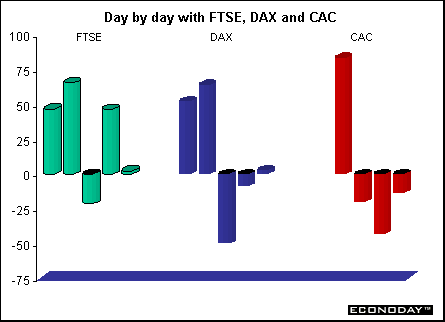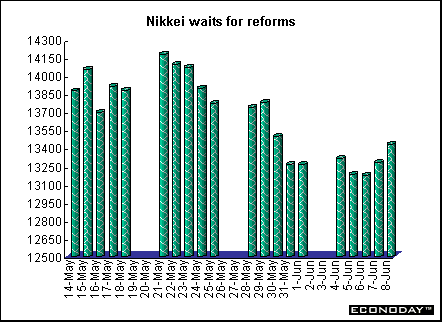 |

Britain and Europe
Despite gloomy economic news (see indicator scoreboard below), equities maintained a positive air and rose on the week in decorous trading. Even in Britain where the Labour Party and Prime Minister Tony Blair were looking to be reelected Thursday, the equities markets went along as though it were business as usual. While Labour's second landslide election victory may have caused problems for the pound sterling in the foreign exchange markets, equity investors received the result with equanimity on Friday.

In Europe, most of the gains were in the beginning of the week. Then, the burden of gloomy earnings and economic news began to weigh on the DAX and CAC, which dropped on Wednesday, Thursday and Friday. The ECB offered no interest rate relief to the beleaguered German economy even though manufacturing there is now in recession. U.S. markets offered little stimulus to overcome the bad news.
Asia
The ebb and flow in Asia was governed by earnings pre-announcements, especially from the technology sector. Asian economies, so reliant on purchases by U.S. tech companies, look for any hopeful word that things have leveled off. Market players were relieved that Intel, the biggest computer chipmaker, didn't cut its earnings forecasts. In Japan, however, investors are impatient while they wait out the political machinations prior to the July 29 election and are not particularly content to sit and wait until September for action. Details, details, details of Prime Minister Koizumi's plans are what investors want.

Foreigners were net sellers of Japanese stocks for the first time since mid-March in the week ended June 1, according to the latest figures from the Tokyo Stock Exchange. That compares with a 16-month high of net purchases that helped push the yen up four weeks earlier, amid optimism that Koizumi's policies would help revive the nation's economy. Foreigners sold 105 billion yen ($872 million) more of Japanese stocks than they bought in the week ending June 1, for only the third week of net sales this year. That outflow compares with net purchases of 426 billion yen ($3.5 billion) in the first week of May.
Hong Kong's Hang Seng Index rose led by interest rate sensitive stocks, such as banks and property developers, on expectations of further U.S. interest rate cuts later this month. People are still expecting that interest rates may be cut a further 25 to 50 basis points by the Fed when it meets on June 26 and 27. Hong Kong rates move in line with U.S. rates as its currency is pegged to the U.S. dollar.


Introduction • Global Stock Market Indexes • Recap of Global Markets • Currencies • Indicator Scoreboard

The Bottom Line • Looking Ahead
|
 |